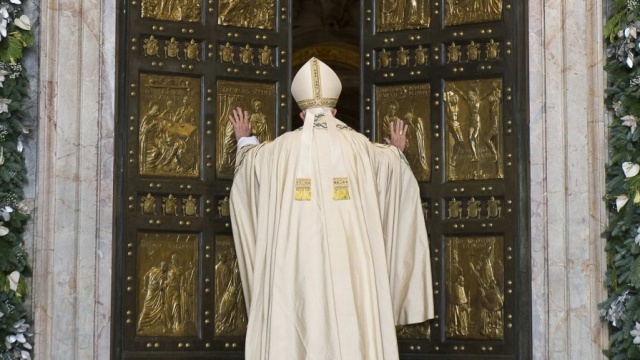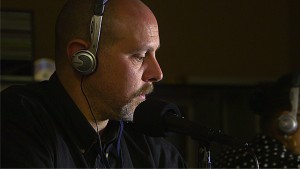Last week we saw that there is a difference between mercy and compassion. Compassion (to suffer with) can be offered to anyone who is suffering. Mercy, on the other hand can only be offered to someone who is guilty and deserves punishment; mercy is offered instead of punishment. Therefore there is a direct connection between mercy and forgiveness. There is also a direct connection between mercy and love. God is perfectly merciful because He is Perfect Love.
In the
Bull announcing the Jubilee Year of Mercy, Pope Francis said,
“I will have the joy of opening the Holy Door on the Solemnity of the Immaculate Conception. On that day, the Holy Door will become a Door of Mercy through which anyone who enters will experience the love of God who consoles, pardons, and instils hope.” (MV 3)
Truly, entering through the Door of Mercy is an experience of love and forgiveness, which consoles us and gives us hope!
One of the most visible signs of a Jubilee Year is the opening and closing of the Holy Door. This refers to traditionally to four specific doors at the four Mayor Basilicas in Rome: St. Peter’s, St. John Lateran, St. Mary Mayor and St. Paul-Outside-the-Walls. This Jubilee Year, however, Pope Francis announced that
“in every local church, at the cathedral
– the mother church of the faithful in any particular area – or, alternatively, at the co-cathedral or another church of special significance, a Door of Mercy will be opened for the duration of the Holy Year. At the discretion of the local ordinary, a similar door may be opened at any shrine frequented by large groups of pilgrims, since visits to these holy sites are so often grace-filled moments, as people discover a path to conversion. Every Particular Church, therefore, will be directly involved in living out this Holy Year as an extraordinary moment of grace and spiritual renewal. Thus the Jubilee will be celebrated both in Rome and in the Particular Churches as a visible sign of the Church’s universal communion.” (To find out which Churches have Holy doors in your area, visit
Jubilee of Mercy. To make this clear, Pope Francis did a little pre-Jubilee-Year-door-opening when he was in
Bangui, Central African Republic.
The first holy door was opened in 1425 in the Jubilee Year decreed by Pope Martin V. Since the Jubilee in 1500 under Pope Alexander VI, all four doors in Rome have been opened. Most of us will remember the last Jubilee year with Pope St. John Paul II in 2000. The act reminds us of Jesus’ words,
“I am the door (or gate); whoever enters through me will be saved. They will come in and go out, and find pasture.” (Jn 10:9) Jesus is the Holy Door. He opens his heart and invites us to enter through Him in order to find rest and salvation.
Walking through a Holy Door is full of meaning. We open doors to walk through them. We go through doors to go inside a space, but also to go outside. Doors separate two distinct spaces, an outdoor one and an indoor one. One way to see it is that we leave the “outside” profane space and enter the “interior” sacred space.
As we enter, we cross the threshold of the door. Crossing signifies crossing or reaching a milestone or goal – a spiritual goal – in the same way that a runner crosses the finish line. (see 2 Tim 4:7) At the same time, reaching a closed door and knocking reminds us that we are invited into a safe place – a refuge. In the middle ages, everyone knew that no matter what or where, if someone were to knock at the door of a convent or Church, they were sure to receive safe refuge. (I hope that it is the case still today!) It reminds us of Jesus’ words:
“Ask and it will be given to you; seek and you will find; knock and the door will be opened to you. For everyone who asks receives; the one who seeks finds; and to the one who knocks, the door will be opened.” (Mt 7:7-8)
“Entering” also means that we are accepting something. It also means that we are accepted and welcomed. In this sense, entering means that we are accepting a particular way of life. It also means that we are accepted into this way of life; we are welcomed into this way of life. This year, we are being invited into the way of mercy.
Going out though a door also has meaning. Going out through a door after being in a sacred interior space, means that, having been transformed, we are going back out into the world in order to live this particular way of life.
On the other hand, sometimes we are holed up in inside spaces that are unhealthy and stale. We need to leave those spaces. Pope Francis referred to these spaces as “conventillos” (little convents) when he
met with young people in Cuba in September. We leave those spaces though doors.
Ultimately, Christ is the Holy Door through which we enter. He invites us:
“Come to me, all you who are weary and burdened, and I will give you rest. Take my yoke upon you and learn from me, for I am gentle and humble in heart, and you will find rest for your souls. For my yoke is easy and my burden is light.” (Mt 11:28-30) It is Christ who is the Door of Mercy that welcomes us and heals us. He is the Door of Mercy that saves all sinners. He is the Door through which we enter to be with the Father.
This Year of Mercy we are being invited to say yes to God’s offer of Mercy. Jesus told
St. Faustina:
“Let the greatest sinners place their trust in My mercy. They have the right before others to trust in the abyss of My mercy. My daughter, write about My mercy towards tormented souls. Souls that make an appeal to My mercy delight Me. To such souls I grant even more graces than they ask. I cannot punish even the greatest sinner if he makes an appeal to My compassion, but on the contrary, I justify him in My unfathomable and inscrutable mercy. Write: before I come as a just Judge, I first open wide the door of My mercy. He who refuses to pass through the door of My mercy must pass through the door of My justice…..” (DSF 1146)
This year of Mercy, we are invited to trust in Christ’s Divine Mercy: We are invited to pass through the door of Christ’s Mercy.
This Year of Mercy is an opportunity to say yes to this invitation and find a safe refuge in His Mercy:
“Tell souls not to place within their own hearts obstacles to My mercy, which so greatly wants to act within them. My mercy works in all those hearts which open their doors to it. Both the sinner and the righteous person have need of My mercy. Conversion, as well as perseverance, is a grace of My mercy.” (DSF 1577)
There are many physical doors that we may enter through this Holy Year. If you can visit a Church near you that has a Holy Door, I think you should go. Make that crossing, a sign of the real crossing that you intend to do this year. May your physical entering be a true sign of the spiritual entering or crossing that you intend to do this year. But, if you are not able to actually visit a Church and go through a Holy Door, you can still make that spiritual entering or crossing. Don't hold back from entering just because you couldn't go through a physical Holy Door!
Better yet, we
ourselves can become doors for others. This is what mercy demands. When we care for the poor and welcome those who are excluded, those who are marginalised and welcome sinners, when we pray for them, we are opening the door to Jesus and we are opening a door for them to find Jesus. This is what Jesus’ great commission calls us to do: Go and make disciples of all nations. (Mt 28:19) It means, “go and open doors for them.” This is our mission.
More importantly, let this Year of Mercy be one where we go inside a space of love where we can contemplate on those who have trespassed against us and whom we need to forgive. But let’s also go outside of those spaces where we are holding on to old grudges and pain; those spaces where we are unwilling to forgive.
When we do this remember that we will be experiencing the love of God that consoles us, forgives us and offers us hope. (MV 3)
Come back
next week so we can look at Mercy from the beginning.
-
Photo credit: CNS photo/L'Osservatore Romano
Every week, Deacon Pedro takes a particular topic apart, not so much to explore or explain the subject to its fullness, but rather to provide insights that will deepen our understanding of the subject. And don’t worry, at the end of the day he always puts the pieces back together. There are no limits to deaconstructing: Write to him and ask any questions about the faith or Church teaching:
[email protected]

